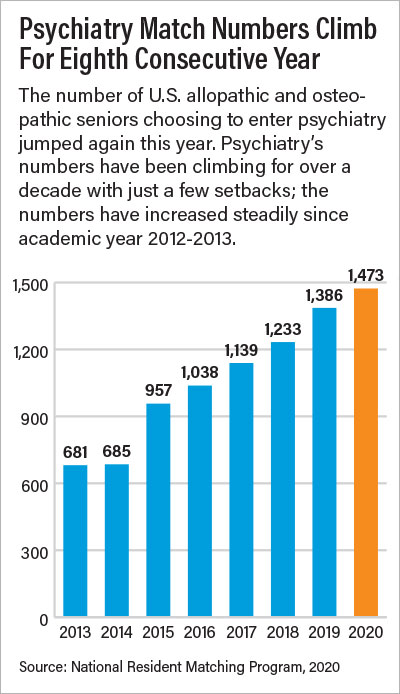Psychiatry’s Match Numbers Continue to Rise
Abstract
Education expert and former APA trustee Sidney Weissman, M.D., cautions that the COVID-19 pandemic could disrupt training in unpredictable ways for residents.
A total of 1,473 U.S. senior allopathic and osteopathic students matched with a psychiatry residency program this year through the National Resident Matching Program (NRMP), up from 1,386 in 2019.
This marks the eighth consecutive year that psychiatry has experienced a jump in the number of graduating students entering the profession, reflecting both increasing interest in a field that has grown richer and more neurobiologically informed and dramatically ramped-up competition for slots in other specialties.
“Medical students today recognize psychiatry as the medical specialty that really integrates mind, brain, and body,” said APA Director of Education Tristan Gorrindo, M.D. “The steadily increasing numbers of students entering our profession is certainly welcome, and I trust and expect it to continue. We applaud the efforts of the Accreditation Council for Graduate Medical Education to expand the number of general psychiatry residency slots in recent years to address psychiatry’s workforce shortage.”
He urged trainees to consider membership in APA and to visit the APA website for information about membership and resources that APA offers to residents.
A total of 1,858 psychiatry residency positions were offered through this year’s match, of which 1,838 were filled. The 1,473 U.S. senior medical school seniors who filled those slots were joined by physicians who had graduated in earlier years (71) and U.S. and non-U.S. international medical graduates (293) and others (1).
Psychiatry’s numbers have been on a generally upward trend from the 1990s, when the profession’s match numbers were in the 400s for much of the decade, with some waxing and waning in the mid-2000s. But beginning in academic year 2012-2013, the match numbers for psychiatry began to climb steadily, with particularly dramatic increases in the last six years (see chart).

The NRMP is a private, not-for-profit organization established in 1952 to provide “an orderly and fair mechanism” to match the preferences of applicants to U.S. residency positions with the preferences of residency program directors for those applicants. The NRMP is sponsored by the American Board of Medical Specialties, the AMA, the Association of American Medical Colleges, the American Hospital Association, and the Council of Medical Specialty Societies.
Sidney Weissman, M.D., a past APA trustee and past president of the American Association of Directors of Psychiatric Residency Training, said that the growing interest in psychiatry is due to multiple factors including competition for other specialty slots as the number of medical school seniors rises, as well as the increasing attractiveness of the specialty because of research advances in understanding the brain and psychiatric disorders. He said the trend is likely to continue in psychiatry’s favor.
“Senior medical students, aware of the limited number of residency positions in sought-after specialties, are considering more options as they plan their medical careers and as they heed the advice of their deans to apply to more than one specialty,” Weissman said in an analysis he sends each year to educators and others interested in the Match. “This is why many programs have interviewed applicants applying in more than one specialty.”
Weissman said the COVID-19 pandemic could impact the education of new trainees. “We do not know if this year’s medical graduates will be able to reach their residencies by July because of the coronavirus,” Weissman said. “Will some of them be quarantined at home because of the virus or otherwise unable to travel? Will the administrations of our hospitals be able to process their employment and our states their medical licenses? Will they be able to find housing? In responding to the coronavirus crisis, will hospitals need all of our new residents to work in primary care, at least in the first months? Will we be able to maintain our educational mission with our hospitals functioning in crisis mode with sick staff and residents?
“We must be prepared for all exigencies.” ■



